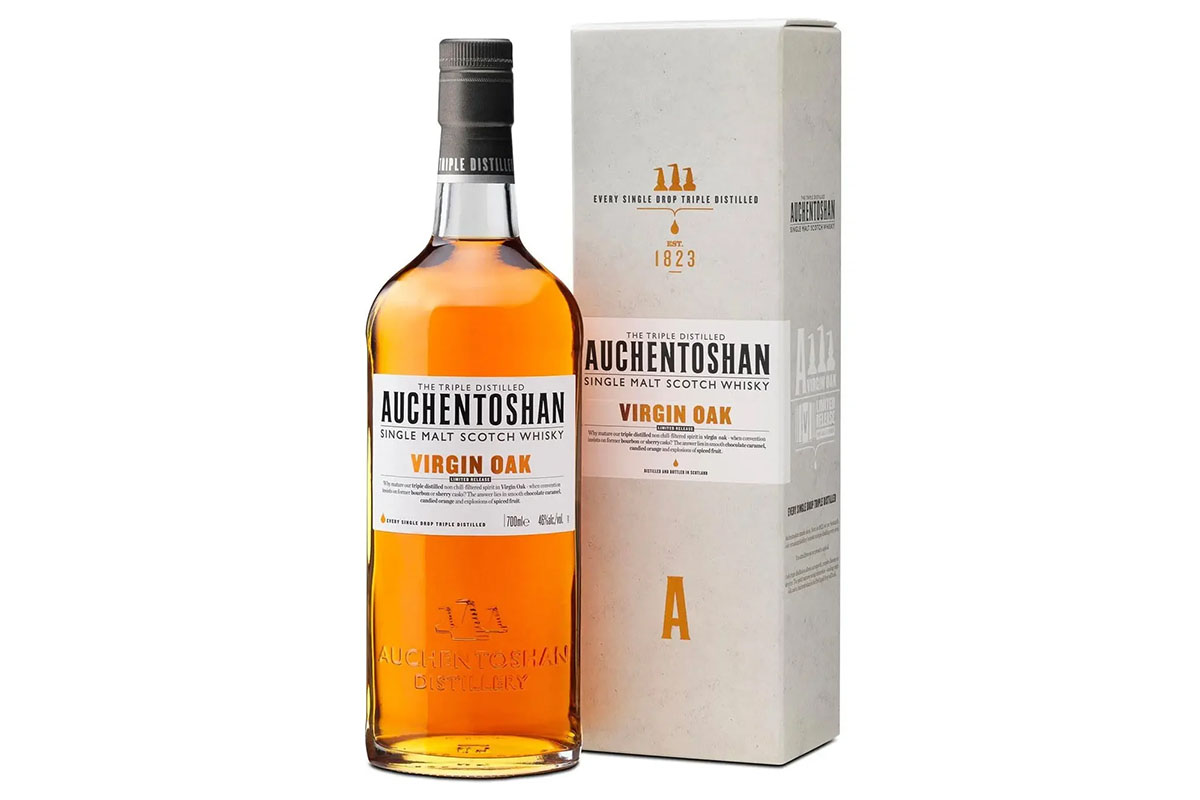The Auchentoshan Virgin Oak is the limited edition bottling from the increasingly popular Lowland single malt distillery. The whisky has been fully matured in ex-American virgin oak casks (the term ‘virgin’ refers to the fact that the casks have never had any spirit maturing in them before), which is rare in the Scotch whisky industry.

Auchentoshan (pronounced ock-en-tosh-an) is the nearest distillery to Glasgow. It is located in the Lowlands region and sits to the north west of the city near Clydebank. It was officially founded in 1823, although records shown a distillery called Duntocher operating very nearby in the early 1800s. Auchentoshan translates as ‘corner of the field’ from the local form of Gaelic and is currently owned by Morrison Bowmore, which is a subsidiary of the Japanese company Suntory. It has a current production of 1.75 million litres per year.
Auchentoshan is unique amongst Scottish whisky distilleries as they triple distil every drop of their spirit. Elsewhere in Scotland the common practice is to distil twice, whereas triple distillation is more commonly associated with Irish whiskies. Triple distillation produces a new make spirit that is lighter and more delicate in flavour and higher in alcohol – Auchentoshan has the highest strength of new make in Scotland at 81.5% ABV.
Auchentoshan have been maturing stock in virgin oak casks since the early 2000s. The new whisky is presented in the white Auchentoshan ‘limited edition’ packaging with bold type and iconography. Quantities have not been revealed to date, and it is believed that further batches are in the pipeline. The Virgin Oak will be available shortly through specialist whisky retailers. It is bottled at 46% ABV and carries a recommended retail price of £69.99.
Our tasting notes
The colour is golden yellow and the nose is initially delicate and has a lovely freshness. There are prominent aromas of honey and vanilla, and these are joined by some crisp green apple and freshly sawn wood. Underneath is a subtle floral note, which is reminiscent of honeysuckle, and soft aromas of freshly cut grass and Further aromas of brown sugar, cinnamon spice and a twist of lemon zest round things off.
On the palate, there is an instant battle going on – the woody and spicy notes from the nose seem much more prominent, and these threaten to take over the more subtle and delicate notes. Initially there is plenty of the freshly sawn wood and this is quickly joined by some cinnamon and nutmeg-like spice. Underneath are the notes of honey and vanilla, which just about hold their own with the help of a lovely creamed coconut note. For what initially seems like a light and basic whisky, the depth and complexity keeps getting added to. Then comes some fruit (think of the green apples again and lemon zest, plus something tropical like pineapple), crumbly brown sugar and more honey. These combinations balance the woody spiciness and adds a pleasant mouth-watering dryness.
The finish begins with the honey-like sweetness, which is joined by notes of vanilla custard and barley sugar. These fade to reveal the apple and lemon elements, before the woody spices come back to the fore. It is these, especially the cinnamon and coconut (think of the husks), that leave your mouth feeling very dry. They linger for ages. Delicious.
What’s the verdict?
This new offering from Auchentoshan is one of their best of recent times. It mixes a lovely series of delicate, floral and fruity notes with a powerful kick of woody, oaky spice from the virgin oak casks, and does it very well. These spicy notes could easily overwhelm the more subtle ones, but a balance is just about maintained. It is a delicious light, vibrant whisky.
The main issue with the Auchentoshan for us is the price, which seems slightly high. If it was around the £50-55 mark, rather than £70, then we would almost definitely buy a bottle. We suppose the rarity of the casks and nature of the experimentation have dictated the final price.







